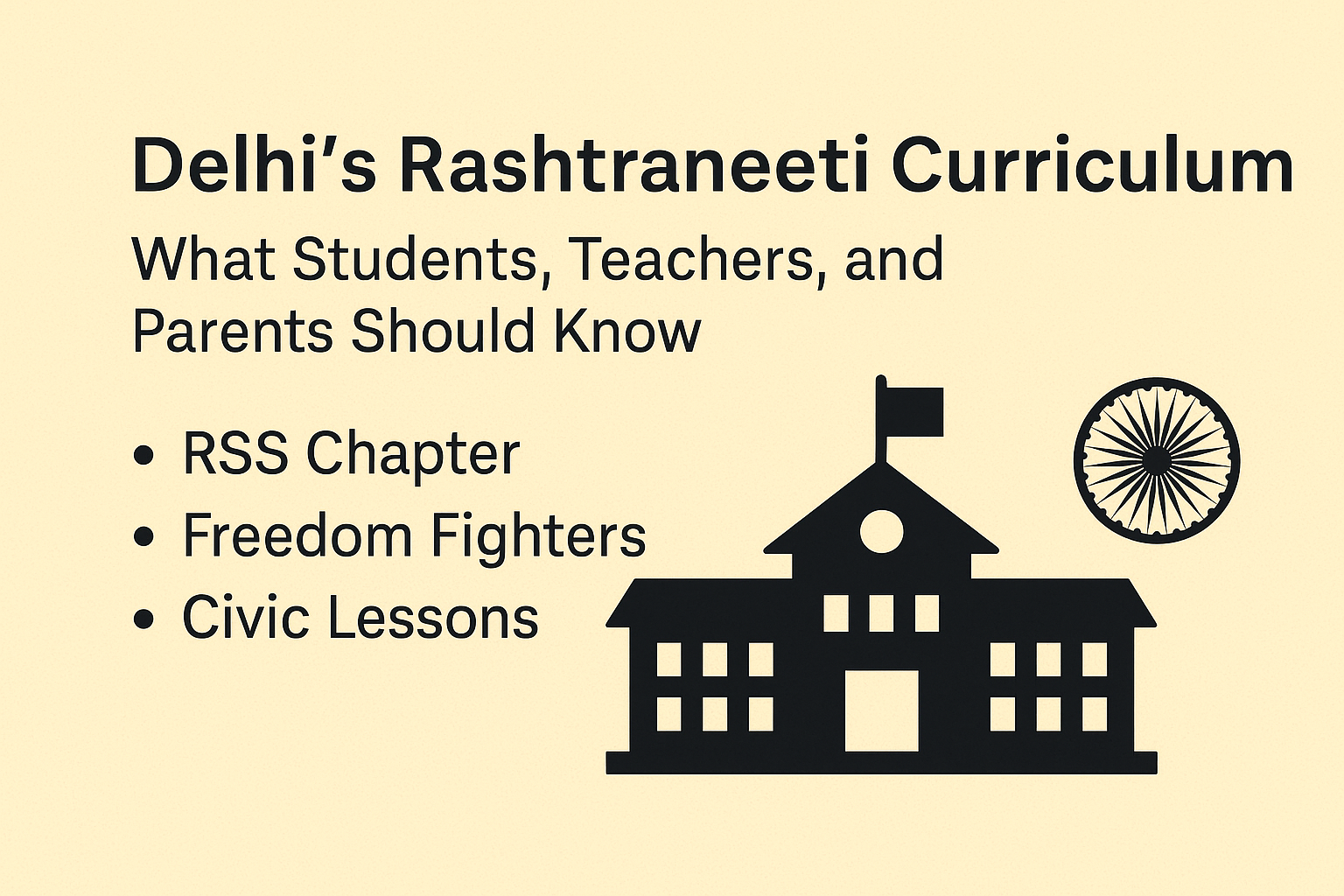The Delhi government is rolling out a new subject, Rashtraneeti, across government schools for Classes I to XII. The curriculum combines civic studies, ethical governance, and India’s freedom struggle with a controversial addition: a dedicated chapter on the Rashtriya Swayamsevak Sangh (RSS). Alongside this, students will study leaders such as Veer Savarkar, Shyama Prasad Mookerjee, Sardar Patel, and Atal Bihari Vajpayee.
Here’s a balanced look at what’s changing, why it matters, and what questions still need answers.
What Is the Rashtraneeti Curriculum All About?
Rashtraneeti is being positioned as a civic education subject to instill awareness of fundamental duties, national identity, and ethical governance. It is designed for students across primary and secondary levels, with lessons on both historic figures and contemporary civic responsibilities.
Confirmed Features of Rashtraneeti in Delhi Schools
- A full chapter dedicated to the RSS, including its centenary (RSS @ 100) and social initiatives.
- Modules on freedom-era leaders such as Patel, Savarkar, Subhas Chandra Bose, and Vajpayee.
- Teacher orientation and training sessions already underway at SCERT.
- Textbooks expected to be finalized and distributed later this year.
What We Don’t Know Yet
- Specific grade-wise allocation of chapters remains unclear.
- Some reports differ on whether the RSS content will be optional or compulsory.
- The tone of the material—whether neutral, critical, or celebratory—has not been confirmed.
- Rollout timelines vary, with content still under review.
Why the New Curriculum Matters for Every Stakeholder
For Students
The subject could enrich civic education, but whether it encourages critical thinking or presents a one-sided narrative will be crucial.
For Teachers
Successful delivery depends on effective training. Teachers will need strategies to present sensitive topics objectively and create space for dialogue.
For Parents
Parents should seek clarity and engage in discussions about balance, neutrality, and representation in the curriculum.
For Policymakers
The credibility of Rashtraneeti depends on whether it is framed as broad civic learning or ideological instruction. Transparency and inclusivity will be key.
Key Questions the Public Should Be Asking
- Will students be taught to critically analyze the role of the RSS and freedom leaders?
- How will schools maintain neutrality while covering politically significant organizations?
- Will parents, educators, and civil society be allowed to review drafts before implementation?
- Could this Delhi experiment influence national education policies?
Final Take
Rashtraneeti could become a meaningful civic education initiative if implemented with balance, diversity of perspectives, and transparency. If not, it risks being viewed as a political project rather than a learning tool. How Delhi chooses to roll it out will set the tone for how young generations engage with India’s democratic story.
FAQs
What is the Rashtraneeti curriculum in Delhi schools?
Rashtraneeti is a new subject being introduced in Delhi government schools from Classes I to XII. It focuses on civic duties, ethical governance, national identity, and India’s freedom struggle.
Why is the RSS included in the Rashtraneeti syllabus?
According to government officials, the RSS chapter is meant to highlight the organization’s history, centenary, and role in social initiatives. Critics argue the inclusion could be seen as political, so the framing of content will be closely watched.
Which leaders will students learn about under Rashtraneeti?
Students will study figures such as Veer Savarkar, Sardar Patel, Shyama Prasad Mookerjee, Subhas Chandra Bose, and Atal Bihari Vajpayee, alongside lessons on civic responsibilities.
When will the Rashtraneeti textbooks be available?
Drafts are still under review. Reports suggest textbooks are expected to be finalized and distributed later this year, likely by November.
Is the Rashtraneeti curriculum compulsory for all students?
The subject is intended for all Delhi government school students, but details on whether specific chapters like the RSS module are mandatory are still being finalized.
How are teachers being prepared for Rashtraneeti?
Teachers are undergoing training and orientation through SCERT to help them deliver the subject effectively and objectively.
Why is the Rashtraneeti curriculum seen as significant?
It’s significant because it blends civic education with politically sensitive topics. Its impact will depend on how balanced the final textbooks are and how teachers handle classroom discussions.

